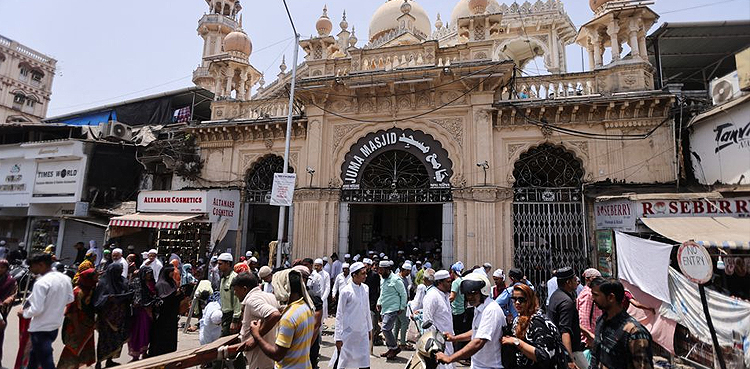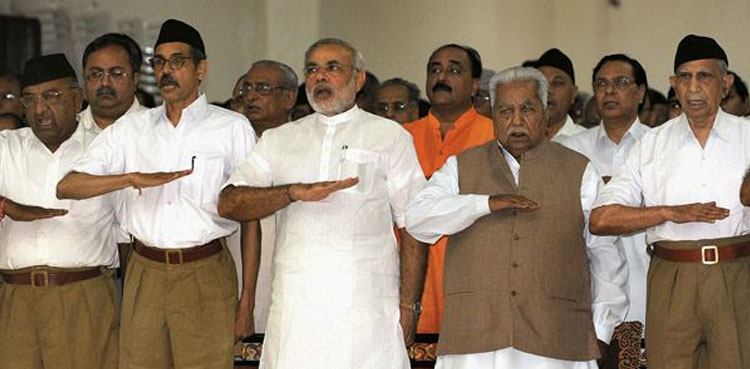
The potency of poisonous atmosphere created against Muslims in India by Modi regime has now made life impossible for India’s biggest minority.
Muslims are virtually alienated from the mainstream in India and face extreme persecution in all parts of the country. The difficulties faced by the Indian Muslims came to the fore when on Eid festival falling after two-years of Covid restrictions the Muslims became the butt of extremist Hindu frenzy as mosques came under renewed attack and Muslims had to bear physical assaults.
The spate of violence against Muslims has resulted in creating deep fears in them knowing full well that the rioting will fester to all parts of the country. The rule of Prime Minister Narendra Modi’s Hindu nationalist Bharatiya Janata Party has emboldened hardline Hindu religious groups in recent years to take up causes that they say defend their faith, although his party has denied any rise in communal tensions during Modi’s reign.
It was accordingly reported that Eid celebration, Jodhpur, Rajasthan were marred by communal clashes attributed to a discord on the hoisting of a religious flag.

These violent clashes erupted when members of the Hindu and Muslim communities threw stones at each other over hoisting of a religious flag in the Jalori Gate area.
It was mentioned that there were flags of Hindu deity Parashuram ear the area where Namaz is offered and there arose a dispute about removing the flags as the local Muslim community puts up a flag every year on the occasion of Eid.
Azaan: Mumbai mosques turn volume down after Hindu-extremists’ demands
It was also reported that loudspeakers installed in the area for Eid prayers were also taken off during the violence in which at least five policemen, among several others, were injured.
The rioters also broke window panes of several vehicles and vandalism was reported in several ATMs as well. As a result of the clashes, curfews have been imposed in several parts of the city and the district administration has suspended internet services.
This episode is the latest in a spate of communal clashes that have taken place in India in recent weeks.
Earlier on 16 April, six police officers and several others had been injured during violent communal clashes that marred the procession at a festival in Jahangirpuri, a suburban section of New Delhi with Indian police arresting 14 people in connection with clashes.
On 2 April, communal clashes broke out in Karauli area of Rajasthan after stones were pelted at a motorcycle rally taken out to celebrate the Hindu New Year, prompting authorities to clamp a curfew, suspend the internet and deploy 600 police personnel.
Around 35 people were injured in the violence, 46 people were initially taken into custody by police for interrogation and a case was registered against 13 people and houses and shops were set on fire during the episode.
For its part, Pakistan had strongly condemned the senseless vandalisation and burning of more than 40 houses of the Muslim community by Hindu zealots during those communal clashes.
These concerns are justified as this issue creates lot of anger in Pakistan and it is important to condemn them as much as possible.
The increasing harmful effects of BJP majoritarian democracy brand have now started to elicit international condemnation particularly from America.

It was the third straight year that the US Commission on International Religious Freedom asked that India be placed on a list of countries of particular concern, a recommendation that has angered New Delhi and is virtually certain to be dismissed by the State Department.
In India, the commission pointed to numerous attacks on religious minorities, particularly Muslims and Christians, in 2021 as Prime Minister Narendra Modi’s
government promoted its ideological vision of a Hindu state through policies hostile to minorities.
The report explicitly mentioned that religious freedom conditions in India significantly worsened pointing to a culture of impunity for nationwide campaigns of threats and violence by mobs and vigilante groups and arrests of journalists and human rights advocates.
The Indian government in previous years has angrily rejected the commission’s findings, accusing it of bias.
Adding greatly to the emerging voices of condemnation, a top American diplomat —
Ambassador at large for International Religious Freedom — joined US scholars and
rights activists in condemning efforts to make India Muslims a persecuted minority. Rashad Hussain, an American Muslim of Indian origin who is the Biden administration’s Ambassador at large for International Religious Freedom, reminded New Delhi in a tweet that Indian Muslims too had the right to wear what they liked.
He stated that religious freedom includes the ability to choose one’s religious attire and that the Indian state of Karnataka should not determine permissibility of religious clothing adding that Hijab bans in schools violate religious freedom and stigmatise and marginalise women and girls.
Noam Chomsky, the famed American scholar, noted in a speech that while Islamophobia was growing in the West too, the situation was even worse in India.
He said that the pathology of Islamophobia is taking its most lethal form in India.

He stated that the crimes in Kashmir have a long history of communal clashes turning the state into a brutally occupied territory and its military control in some ways is similar to occupied Palestine.
Chomsky, who is also Professor Emeritus at Massachusetts Institute of Technology, told the webinar that Islamophobia in India was turning India’s 250 million Muslims into a persecuted minority.
The webinar also mentioned that the BJP was also preventing the media from reporting what was happening inside the country.
The situation in Kashmir is dire, where the journalists routinely face police questioning, ban on reporting, suspension of internet services and financial constraints in line with BJP’s recent media policy. It was added that the greatest threat to the Indian constitution was the promotion of majority religion by the Indian government at the expense of minorities.
It concluded that BJP and its affiliates are making hateful remarks against Muslims to gain Hindu votes around elections.
A US-based advocacy group Human Rights Watch (HRW) also highlighted this issue in itslatest report on India.
It mentioned that the government adopted laws and policies that discriminated against religious minorities especially Muslims and this, coupled with vilification of Muslims by some BJP leaders and police failure to take action against BJP supporters who commit violence, emboldened Hindu nationalist groups to attack Muslims and government critics with impunity.
The HRW 2022 report noted that Hindu mobs beat up Muslims, often working-class men, with impunity while pro-BJP supporters filed baseless complaints against critics, especially religious minorities.
HRW also stated that along with Muslims other religious communities are also persecuted citing an incident in October 2021, when over 200 workers of BJP Youth Wing, Vishwa Hindu Parishad (VHP) and Bajrang Dal attacked a church in Uttarakhand state, vandalising property and injuring several churchgoers.
The attack came soon after the VHP allegedly threatened to demolish churches in Madhya Pradesh state’s Jhabua district, claiming they were doing illegal religious conversions.
The report noted that Hindu nationalist groups also attacked churches in Chhattisgarh state.
Several states enacted anti-conversion laws that have been largely used to target minority communities, particularly Christians, Muslims, Dalits, and Adivasis.
The report noted that allegations of torture and extrajudicial killings persisted with the National Human Rights Commission registering 143 deaths in police custody and 104 alleged extrajudicial killings in the first nine months in 2021.
from International News Today - Breaking News, US News, World News https://ift.tt/7lXF205
via IFTTT